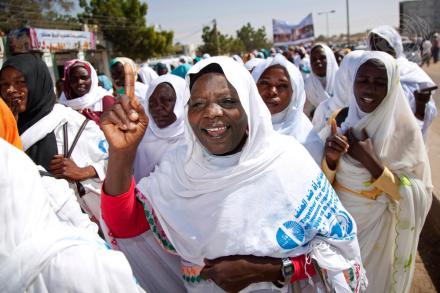
Strengthening women's role as agents of peace: UNSSC's work on Women, Peace and Security
Our Peace and Security Hub supports the implementation of the Women, Peace and Security (WPS) agenda by delivering impactful, evidence-based learning and advisory services. In line with Action 5 of the Secretary General’s New Agenda for Peace we equip United Nations (UN) civilian and uniformed personnel, as well as their partners, including civil society actors, military representatives and government officials, with the skills and tools to embed gender equality and intersectionality into their work and mandates.
As a center of excellence for inter-agency learning, UNSSC plays a strategic role in strengthening the UN system’s ability to advance gender-responsive, inclusive and rights-based approaches to sustaining peace. Our contributions respond to the urgent call to realize the transformative potential of the WPS agenda and reframe prevailing narratives, recognizing women as leaders and agents of peace, change and social transformation. Our learning and advisory services are inclusive, locally grounded and accessible, designed to reach individuals who face intersecting forms of discrimination, including Indigenous women, older persons, persons with disabilities and LGBTQI+ individuals.
What we offer

Introductory sessions on WPS
We use interactive formats such as webinars, keynote speeches, facilitated dialogues and panel moderation during workshops and events to build foundational awareness of the Women, Peace and Security agenda and spark critical dialogue tailored to the context and audience.
Self-paced and online learning products
We offer a suite of digital resources, including self-paced modules, micro-learning experiences and knowledge nuggets, designed to support continuous and flexible learning on WPS themes, available in multiple languages and adaptable to various institutional contexts.
Training packages on gender responsiveness
We provide specialized training packages focused on gender-sensitive conflict analysis, results-based budgeting (RBB) using gender markers, and the integration of WPS commitments into planning, programming and reporting within UN entities and partner institutions.
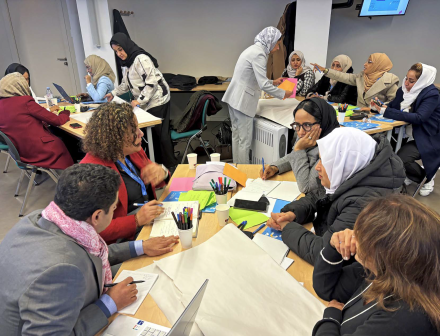
Training of trainers programmes
Through Training of Trainers (ToTs) grounded in transformative learning methodologies, we equip participants with the knowledge, facilitation skills and confidence to deliver impactful WPS-related trainings, fostering long-term internal capacity to advance the agenda within their organizations and communities.
Operational toolkits for practitioners and trainers
We offer practical and context-sensitive toolkits designed to help trainers, field staff and institutions operationalize the WPS agenda. These resources provide step-by-step guidance, methodologies, templates and checklists to translate normative commitments into action.
Empowerment & resilience programmes for women in peace and security
We develop targeted programmes that build women's resilience, agency and participation in peace and security processes. These offerings support skills development, peer exchange and psychosocial empowerment in fragile and conflict-affected settings, with sensitivity to local realities.

Thematic workshops on WPS and cross-cutting issues
We deliver workshops exploring the intersection of WPS with emerging and cross-cutting themes such as artificial intelligence, climate change, gendered disinformation, peace tech and technology-facilitated gender-based violence (GBV). These sessions combine critical inquiry with practical exploration of policy and programming responses.
Advisory support for UN managers
We offer strategic and technical advisory services to support UN managers and senior staff in implementing WPS mandates. Services include guidance on institutional planning, human resources (HR) and procurement policies, reporting obligations, and the integration of WPS into M&E frameworks.
Tailor-made trainings and learning solutions
We provide fully customized learning solutions co-designed with partners to respond to specific priorities, audiences and operational contexts. These offerings draw from UNSSC’s full methodological toolkit and are available in English, French, Arabic and additional languages as needed.
How we work
Our Women, Peace and Security learning, training and advisory services are grounded in collaboration, contextual relevance and inclusive design. Whether delivering training programmes, toolkits, or training of trainers, we co-create each offering with the partner to ensure alignment with their priorities and realities on the ground. Every intervention begins with a comprehensive learning needs assessment, conducted directly with the intended users, to ensure that the final product is not only relevant but also inclusive and actionable.
We have worked with diverse audiences across Africa, the Middle East, Latin America, and beyond through both in-person and virtual modalities. Our team delivers programmes directly in Arabic, French and English, and we also co-develop learning content in additional languages such as Georgian, Malagasy and Portuguese, using professional human translators in collaboration with local experts. This commitment to linguistic and cultural accessibility ensures our work is not only informed by local perspectives, but also accessible and impactful across regions and communities.
Past projects and collaborations
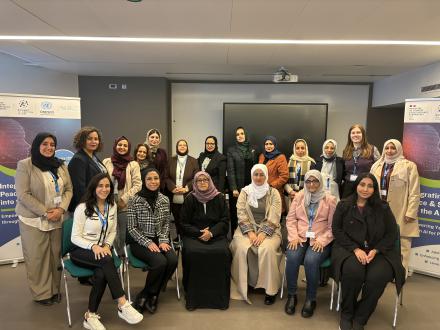
In partnership with the Office of the Special Envoy of the Secretary-General for Yemen (OSESGY) and the French Ministry for Europe and Foreign Affairs, UNSSC co-convened a workshop on the sidelines of the Artificial Intelligence Action Summit in Paris (10-11 February 2025) to explore the intersection of Artificial Intelligence (AI) and the Women, Peace and Security (WPS) agenda in Yemen.
The workshop brought together Yemeni women leaders, peacebuilders and human rights defenders to discuss both the opportunities and risks of leveraging AI in support of gender-responsive peacebuilding. Grounded in the four pillars of the WPS agenda – participation, protection, prevention, and relief & recovery – participants examined the use of AI to promote women’s meaningful inclusion in peace processes, while also addressing concerns such as algorithmic bias, digital exclusion and technology-facilitated gender-based violence.
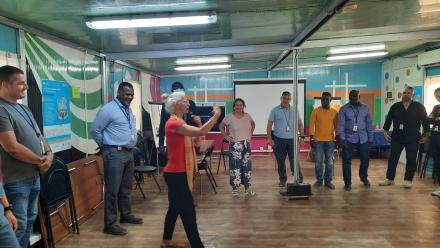
Developed in collaboration with UN Women Haiti as part of the project “Reinforcement of Leadership and Participation of Women in Conflict Prevention and Resolution for Sustainable Peace in Haiti”, this modular digital training toolkit equips local trainers and facilitators to strengthen women’s leadership in peacebuilding and mediation.
Co-designed with Haitian civil society representatives and UN Women following an in-depth learning needs assessment, the toolkit is available in French (with a Creole version under consideration) and is tailored to low-literacy and offline contexts. It integrates printable materials, audio-visual content, interactive exercises and a video tutorial to guide users through its structure. With over 100 standalone resources, the toolkit allows practitioners to select and use materials flexibly, anytime, in any order, based on local needs.
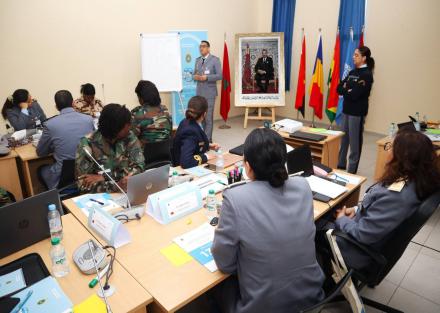
In collaboration with UN Women Morocco and the Royal Armed Forces of the Kingdom of Morocco, UNSSC designed and delivered two editions of a Trainer of Trainers (ToT) programme on the Women, Peace and Security (WPS) agenda between November 2024 and February 2025. The initiative brought together gender advisors, gender focal points and representatives of armed forces from Morocco and other African countries, marking a strategic engagement with uniformed military personnel in advancing the WPS agenda.
Blending a preparatory online session with a five-day in-person workshop in Rabat, participants explored adult learning principles, transformational pedagogies and facilitation techniques tailored to WPS. A dedicated virtual platform on the UNSSC e-lounge supported ongoing peer exchange and access to curated learning materials.